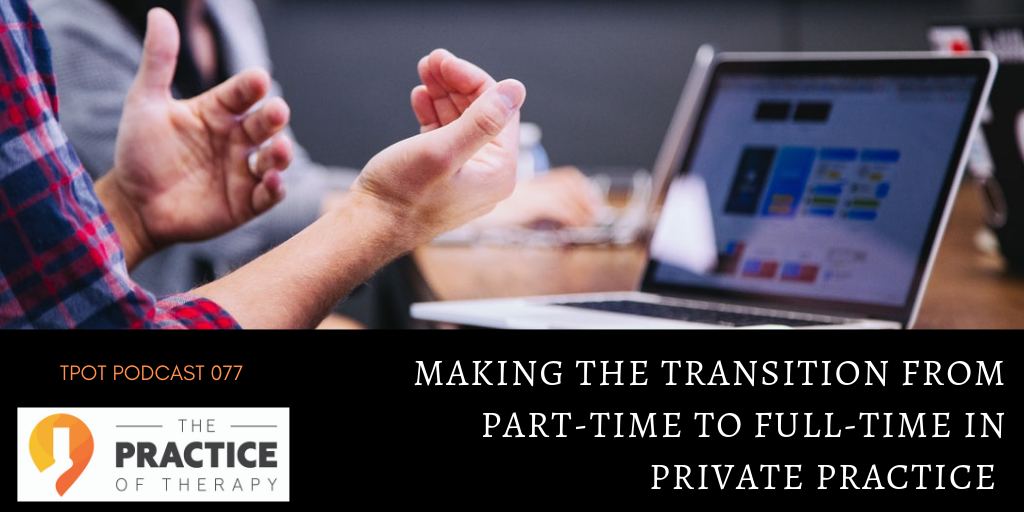In this episode, Gordon talks about making the transition from part-time to full-time in private practice. It’s a question Gordon gets pretty frequently. First, ask yourself what is your “why”… why do you want to be in private practice, to begin with? Gordon started his private practice to focus more of his attention on his family and pursue his passion of helping people, being a practice owner and entrepreneur. The most significant factor to consider when moving to full-time is having a financial buffer. Later, Gordon discusses how to adopt the right mindset and to give yourself permission to not have a sense of urgency about it. Give yourself whatever time you may need to make the transition into private practice. Be meticulous and methodical about it.
Ask Yourself Why
Working for someone else limits the time you want to spend in your own life. One of the places to start when thinking of going into private practice is to really ask yourself why. For Gordon, his why was because his wife was diagnosed with breast cancer. In addition, his daughter was entering high school, and he wanted to spend time on band trips. Gordon started his private practice while working for an agency to bring in some extra income. In the back of his mind, he knew it was something he would eventually do full-time.
Moving to Full-Time
Make sure it is financially viable to make a move into full-time private practice. Do not quit your day job until you know there is a buffer in place. In other words, you have money saved away to help you make the transition. In Gordon’s journey, he saw people on the weekends and during evenings. As word started to spread, things began to pick up, and he built a website. Once he had his site up things really started to pick up. People were finding him online and through his website. Once a part-time job surfaced at his ministry, he knew the salary would be a big enough buffer to assist with the transition to private practice. Then, he reached the point where he needed to quit his part-time job and pursue private practice full-time.
Financial Buffers
First, Gordon realized he would need to support himself solely on his part-time job and use all the money from his private practice to put into savings. He opened a money market account which is an interest-bearing account to save away enough money to transition into full-time private practice. Another way to have financial stability is by starting a group practice. It will allow you to rely not only on your income but the income of others. Make plans in advance for retirement and health insurance, you do not want to consider these things when it is too late down the road. At a very minimum, two months of your salary will be a decent buffer to get you going. Also, look at how you can diversify your income streams. Gordon started a group practice to diversify his income and reap the benefits of another person’s work.
Resources Mentioned
Being Transparent… some of the links below are affiliate links. This simply means we get a commission, at no extra cost to you, if you use the links to make a purchase. Thanks for using the links!
Practice Solutions
Brighter Vision
Therapy Notes
Money Matters in Private Practice
G-Suite For Therapists
[amazon_link asins=’1328972356,B07D9499N2,073521414X’ template=’ProductCarousel’ store=’practiceoftherapy-20′ marketplace=’US’ link_id=’ecadb231-005a-4e12-aa65-5bed01fe16bd’]
Meet Gordon Brewer, MEd, LMFT
Gordon is the person behind The Practice of Therapy Podcast & Blog.He is also President and Founder of Kingsport Counseling Associates, PLLC. He is a therapist, consultant, business mentor, trainer and writer. PLEASE Subscribe to The Practice of Therapy Podcast on iTunes, Stitcher and Google Play. Follow us on Instagram @TPOTpodcast, Twitter @therapistlearn and Pinterest “Like” us on Facebook.


